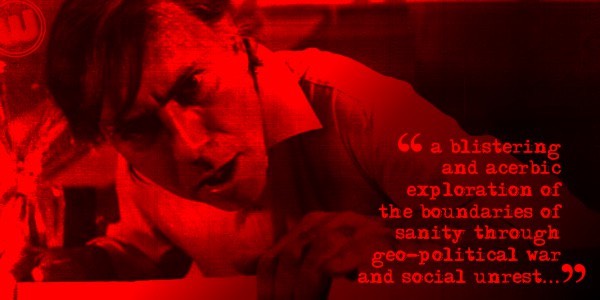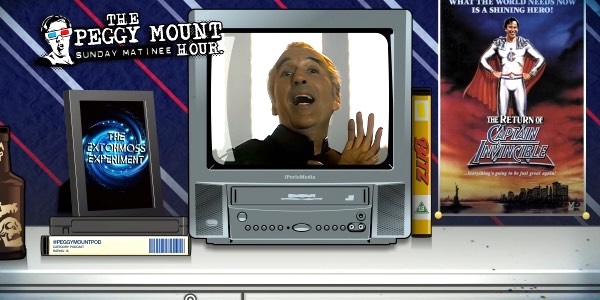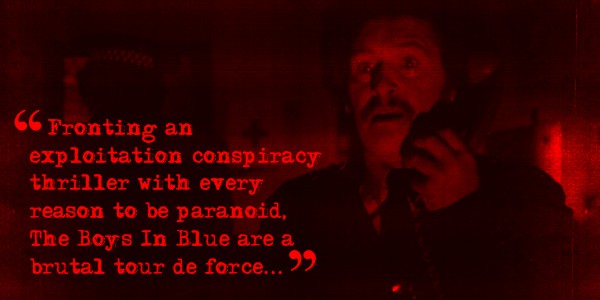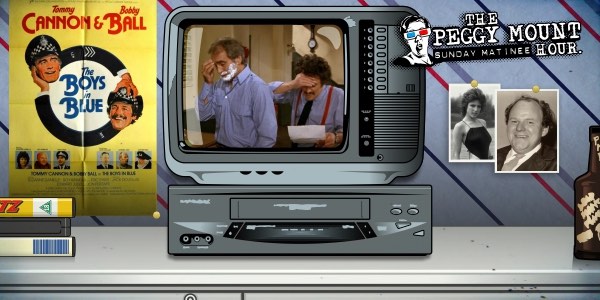
The Return Of Captain Invincible
Cert: PG / 91 mins / Dir. Phillippe Mora / Trailer
Fuck them.
Fuck them all.
Our hero sits in a cold debriefing-room, an open prison cell in all but name. Appearing before a congressional committee has not gone well, although he never thought it would. The usual lines about communism and un-American activities were spun out, but everyone gets that treatment. What made this different was the sheer ingratitude of it all. Captain Invincible essentially won the war for these fucks, basically saved the damned world. And now, less than a decade later, to be hauled across the coals as if everything he'd done - every gesture, every sacrifice, every borderline war-crime - hadn't been flat-out encouraged by the self-same people. Ridiculous. When you've outlived your usefulness, they treat you like trash. Plus ça change. You always knew this day would come, you could see them becoming their own enemy even then.
No, fuck them. Time to make a break, anyway. Time to get the hell out of this city, this country. Sometimes it's better than distance yourself and love the memory of a thing than stick around and watch it burn from within. You can always come back when things are better. That's an option. Besides, a rest will do you good. And if your hunch is right, you're going to need it.
Time to go.
It's a downbeat opening, but fits the tone of Phillippe Mora's 1983 exploration of the superhero perfectly. Bleakly introspective at every corner, The Return Of Captain Invincible proved, somewhat paradoxically, to be box-office Kryptonite, setting back the cinematic careers of its stars Alan Arkin and Christopher Lee by some measure, and relegating its only notable female performer Kate Fitzpatrick to a life of daytime soaps form that point onward. What's more ironic, however, is that the film is so much more than it was given credit for at the time. Appearing to be little more than a wry knock-off of Richard Donner's burgeoning Superman franchise, screenwriters Andrew Gaty and Steven E de Souza instead managed to distill the essences of Watchmen, The First Avenger and Logan before any of those existed, soak the whole thing in gin and serve it up with a bleary eye and a crooked smile. Rarely has a film felt so before its time.
The first act is relatively linear, working through a series of flashbacks as our troubled eponymous hero (Arkin) recalls being selected by the US government for use in the Second World War both as a propaganda machine and an actual weapon. It's shown at this point (although never clearly explained), that Captain Invincible does actually have superhuman powers, and that he was deeply instrumental in the war effort. Society loves and hates celebrity in equal measure of course, and undiagnosed PTSD leads to Cap having a chemically-induced breakdown in the years following Allied victory. A show-trial was held by the notorious Senator McCarthy accusing Cap of being a communist, but the real reason for him being 'dropped' by the authorities was a series of psychiatric reports (carried out too late, naturally) and his continued substance abuse.
Part of Cap's delerium is his continued belief that 'Mr Midnight' - wartime nemesis and second-in-command of Hitler in the supernatural sciences division, played in flashbacks by Christopher Lee - managed to escape death and is carrying out a series of grisly urban murders in the early 1980s, targeting those he deems 'undesirable'...
In the oppressive heat of a decaying city, sirens wail their distress in the distance. The alleyway is filthy, the stained tarpaulin doubly so. Pulled half to one side by the investigating officer and then quickly dropped as he regurgitated his lunch elsewhere, the remains of a body lie exposed to the fetid, stifling air. Flies already attendant as devotees to a shrine, the eyes stare glassily to the heavens - one of the few very features still identifying the mass as being formerly human. A blackened 'M' is branded into what appears to be an exposed organ, although which one - and through which part of the torso it is currently showing - is unclear.
And this, muses Captain Invincible, is the irony. This is end-point calling card which negates the very the point that 'Mister Midnight' thinks he's making. The war-time supervillain has returned like the proverbial bad penny and begun an openly racist killing-spree, knowing full well this is on The Captain's home-turf, baiting him back into active service while continuing the hopelessly misguided aims of the Third Reich. That Midnight was never German never stopped him or caused any impediment to his rise to deputational power. And now, now that his dreams of 'mass extermination' have dwindled down to the evisceration of individual citizens in conurbated squalor... the fact that Midnight's inhuman deeds leave their victims in a state so utterly horrific that their ethnicity cannot even be determined - emphasising the point that humans share far more common traits than those which superficially separate them... well, that irony is lost on him.
A buildup of gases is currently finding a vent from some fold or tear in the... in the meat in front of them, and another officer feigns discretion as she leaves to vomit. 'Okay', thinks Captain Invincible, 'maybe I am back after all...'
So far, so comic-book; a rollicking adventure with admittedly sharp edges. But things take a far darker turn in the present day as we learn that 'Mr Midnight' never existed, being himself a propaganda effort by the Axis powers to mock the Western obsession with comic book culture. However, Captain Invincible has spent so many years - during the war and after it - absorbing nazi and neo-nazi operational literature that an unexplored level of his psyche has embraced it. Cap's patriorism has intensified and turned instead to psychotic fascism, becoming the very thing he's sworn to destroy. The murders of immigrant and ethnic minority citizens have been happening, but they've been carried out by Captain Invincible's alter-alter ego, "Mister Midnight" during a series of blackouts previously attributed to his drug and alcohol dependency.
Again this turn of events feels uncannily prescient, as it not only inspired much of the work of Alan Moore but more soberly presaged real-world politics of the last decade. The Return Of Captain Invincible is a blistering and acerbic exploration of the boundaries of sanity through geo-political war and social unrest. It's a shame therefore that the film jumps the shark in no style at all, cack-handedly underlining its villain's mania by having Arkin's character commit the crimes of his nemesis wide-eyed and in full blackface (hence the name 'Mr Midnight'). This is not acceptable now of course, but it wasn't then either. Such an embedded mis-step couldn't be removed in the editing suite, and so the film was doomed to critical and commercial failure. In fact, its legacy is so toxic that even in our current age of superhero-obsession, no studio will go near it for rebooting. This is, deservedly, Song Of The South for the MCU age...
His head feels like it's weighed down by the soul of every dead body he's seen since this all began, and perhaps it is. Midnight is loving this, his sickening leer splitting his face like a rotting melon full of hate. Captain Invincible tries to straighten, to hold himself proudly, but he knows he's almost spent. This is it. Everything which has happened before has led to this point. This time, there will be no last-minute miraculous escape for either of them, these are the final seconds. But still he has to fight, still he has to try, for where is the dignity in coming this far and giving up?
Mister Midnight observes all this knowingly, wordlessly, understanding the very same with every frantic pulse in Captain Invincible's temple as his world dissolves around him. The wait has been worth it. Come what may, this will be a fitting end for one with such a glorious legacy.
Knowing this action will be the most crucial of his entire life, The Captain summons the last primal reserves of energy from the core of his superhuman being. Most would have died long before this point, he almost did himself, but his eyes snap open in a culmination of will as his hearts pump super-heated blood into his limbs to deliver justice - pure and bloody justice - to the world. His calves, thighs and abdomen tense and unfurl in unison, propelling the hero upward and toward this immortal foe, while his right arm arcs forward the object of his burning enmity; to strike, grab or crush as the moment sees fit.
And in an instant reality crashes down, as Captain Invincible's fist meets a sheet of polished glass...

(Yes, the review above is mostly sarcasm. The actual film is intriguingly crap)
...and if you want to listen to some words about this film which take it far less seriously, are far more sweary and have All The Drink involved, here's a podcast version you might be interested in:
DISCLAIMERS:
• ^^^ That's dry, British humour, and most likely sarcasm or facetiousness.
• Yen's blog contains harsh language and even harsher notions of propriety. Reader discretion is advised.
• This is a personal blog. The views and opinions expressed here represent my own thoughts (at the time of writing) and not those of the people, institutions or organisations that I may or may not be related with unless stated explicitly.




